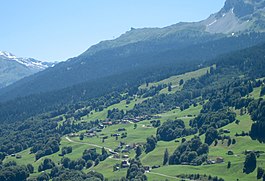Conters im Prättigau
Conters im Prättigau | |
|---|---|
 | |
| Coordinates: 46°54′N 9°47′E / 46.900°N 9.783°E | |
| Country | Switzerland |
| Canton | Graubünden |
| District | Prättigau/Davos |
| Government | |
| • Mayor | Andrea Nold |
| Area | |
• Total | 18.40 km2 (7.10 sq mi) |
| Elevation | 1,110 m (3,640 ft) |
| Population (31 December 2018)[2] | |
• Total | 226 |
| • Density | 12/km2 (32/sq mi) |
| Time zone | UTC+01:00 (Central European Time) |
| • Summer (DST) | UTC+02:00 (Central European Summer Time) |
| Postal code(s) | 7241 |
| SFOS number | 3881 |
| ISO 3166 code | CH-GR |
| Surrounded by | Fideris, Klosters-Serneus, Langwies, Luzein, Saas im Prättigau |
| Website | www SFSO statistics |
Conters im Prättigau (Romansh: ⓘ) is a Swiss village in the Prättigau and a municipality in the political district of Prättigau/Davos Region in the canton of Graubünden.
History
Conters im Prättigau is first mentioned in 1290 as Cunters.[3]
Geography
Conters im Prättigau has an area, as of 2006, of 18.4 km2 (7.1 sq mi). Of this area, 49.4% is used for agricultural purposes, while 45% is forested. Of the rest of the land, 1.3% is settled (buildings or roads) and the remainder (4.4%) is non-productive (rivers, glaciers or mountains).[4]
Before 2017, the municipality was located in the Küblis sub-district of the Oberlandquart district, after 2017 it was part of the Prättigau/Davos Region.[5] It consists of the village of Conters im Prättigau and the hamlet of Brunnen between Conters and Küblis. Until 1961 Conters im Prättigau was known as Conters im Prätigau.[6]
Demographics
Conters im Prättigau has a population (as of 31 December 2020) of 220.[7] As of 2008, 7.7% of the population was made up of foreign nationals.[8] Over the last 10 years the population has grown at a rate of 13.2%. Most of the population (as of 2000) speaks German (97.4%), with Romansh being second most common ( 1.0%) and Italian being third ( 0.5%).[4]
As of 2000, the gender distribution of the population was 48.1% male and 51.9% female.[9] The age distribution, as of 2000, in Conters im Prättigau is; 20 children or 10.3% of the population are between 0 and 9 years old and 24 teenagers or 12.4% are between 10 and 19. Of the adult population, 19 people or 9.8% of the population are between 20 and 29 years old. 24 people or 12.4% are between 30 and 39, 28 people or 14.4% are between 40 and 49, and 29 people or 14.9% are between 50 and 59. The senior population distribution is 19 people or 9.8% of the population are between 60 and 69 years old, 19 people or 9.8% are between 70 and 79, there are 10 people or 5.2% who are between 80 and 89 there are 2 people or 1.0% who are between 90 and 99.[8]
In the 2007 federal election the most popular party was the SVP which received 51.8% of the vote. The next three most popular parties were the FDP (30.5%), the SP (13.2%) and the CVP (4.5%).[4]
The entire Swiss population is generally well educated. In Conters im Prättigau about 64% of the population (between age 25-64) have completed either non-mandatory upper secondary education or additional higher education (either University or a Fachhochschule).[4]
Conters im Prättigau has an unemployment rate of 1.19%. As of 2005, there were 27 people employed in the primary economic sector and about 16 businesses involved in this sector. 6 people are employed in the secondary sector and there are 4 businesses in this sector. 12 people are employed in the tertiary sector, with 4 businesses in this sector.[4]
The historical population is given in the following table:[3]
| year | population |
|---|---|
| 1850 | 195 |
| 1900 | 184 |
| 1941 | 234 |
| 1950 | 219 |
| 1980 | 179 |
| 1990 | 201 |
| 2000 | 194 |
References
- ^ a b "Arealstatistik Standard - Gemeinden nach 4 Hauptbereichen". Federal Statistical Office. Retrieved 13 January 2019.
- ^ "Ständige Wohnbevölkerung nach Staatsangehörigkeitskategorie Geschlecht und Gemeinde; Provisorische Jahresergebnisse; 2018". Federal Statistical Office. 9 April 2019. Retrieved 11 April 2019.
- ^ a b Conters im Prättigau in German, French and Italian in the online Historical Dictionary of Switzerland.
- ^ a b c d e Swiss Federal Statistical Office Archived January 5, 2016, at the Wayback Machine accessed 29-Oct-2009
- ^ Swiss Federal Statistical Office - Amtliches Gemeindeverzeichnis der Schweiz - Mutationsmeldungen 2016 accessed 16 February 2017
- ^ Amtliches Gemeindeverzeichnis der Schweiz published by the Swiss Federal Statistical Office (in German) accessed 23 September 2009
- ^ "Ständige und nichtständige Wohnbevölkerung nach institutionellen Gliederungen, Geburtsort und Staatsangehörigkeit". bfs.admin.ch (in German). Swiss Federal Statistical Office - STAT-TAB. 31 December 2020. Retrieved 21 September 2021.
- ^ a b Graubunden Population Statistics Archived August 27, 2009, at the Wayback Machine (in German) accessed 21 September 2009
- ^ Graubunden in Numbers Archived September 24, 2009, at the Wayback Machine (in German) accessed 21 September 2009





